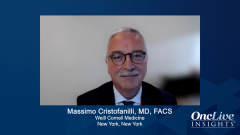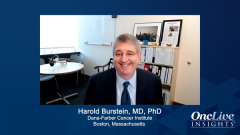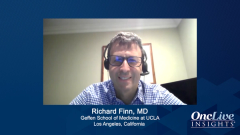
Overcoming Resistance in HR+/HER2- mBC: Novel ADC and SARM Therapy
Considerations for how novel antibody drug conjugates (ADCs) and selective androgen receptor modulators (SARMs) may respectively address mechanisms of resistance within HR+/HER2- metastatic breast cancer.
Episodes in this series

Transcript:
Massimo Cristofanilli, MD, FACS: The field of androgen resistance is standard with our understanding of the molecular features of the disease. Patients with PI3K mutations have the possibility to be treated with an FDA-approved alpelisib. We also know that there’s a mutation in the same pathway—for example, an AKT mutation. At this point, alterations aren’t being properly targeted with a selective agent, like a PI3K ALK inhibitor. There is a study, the CAPItello-292, investigating the role of AKT inhibitors in patients who progress on endocrine therapy, including CDK4/6. They have alterations in the pathway of AKT mutations and PI3K alterations. This is investigated in the combination with fulvestrant. This is based on the prior study that showed the superiority of the combination vs single-agent fulvestrant when the patient progresses on single-agent androgen therapy. Clearly, this study may represent or provide us with another example of targeted therapy that may support the targeted therapy or mTOR AKT pathway in a patient who has progressive endocrine therapy, including CDK4/6. This is with regard to the targeted approach.
There is also a new field of ADCs [antibody-drug conjugates] that shows a tremendous impact on triple-negative and HER2 [human epidermal growth factor receptor 2]–positive disease. Some of the prior phase 1 or phase 2 basket studies have shown an impact on the ER [estrogen receptor]–positive disease. Trodelvy, or sacituzumab, is an example of a drug that’s being investigated…. When used as a single agent, compared with the standard-of-care chemotherapy—for example, capecitabine, vinorelbine, and eribulin—it appears to improve the progression-free survival by approximately 30%. The full data are not available, but this is an early indication that this drug probably has also a role in androgen resistant, hormone receptor–positive disease, not only in triple-negative disease. This would represent an additional opportunity for treatment. Essentially, at the moment that the patient has exhausted their targeted therapy or progressive CDK4/6, they need to be treated with a chemotherapy regimen. This is probably going to represent the first line of effusion therapy or chemotherapy regimen.
The other drug is dato-DXd [datopotamab deruxtecan], which seems to be active in not only HER2+ disease but also ER+. It’s being investigated in the same population compared with the standard-of-care chemotherapy in patients who have exhausted their androgen therapy choices. These 2 ADCs would change our guidelines with regard to the management of patients with hormone receptor–positive metastatic breast cancer. Interestingly enough, there’s also the opposite group of agents, the androgen receptor–targeted agents. This seems to be probably less aggressive, but it still maintains some sensitivity to androgen therapy. We know that androgen has been used in the past when we had only limited therapeutic options, like single agents, to treat breast cancer.
The discovery of the androgen receptor expression, particularly high androgen receptor expression, is a possible molecular therapy associated with androgen resistance. This seemed to open the possibility for a subset of patients to maintain endocrine sensitivity—in this case, to antiandrogen—and maybe carve out another opportunity to delay the chemotherapy for a patient to have progress on standard therapy. This is being investigated. A number of agents are being tested as phase 2 randomized. It’s important to wait for these data to confirm that androgen receptor–high expression is a possible addition to the therapeutic opportunity for this patient or hormone receptor–positive metastatic breast cancer.
Transcript edited for clarity.







































